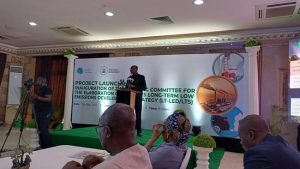On the heels of a Long-Term Vision to 2050 (LTV 2050) that was developed in 2021 under the guidance of the Department of Climate Change (DCC) in the Federal Ministry of Environment, Nigeria has embarked on an initiative to elaborate her Long-Term Low Emissions Development Strategy (LT-LEDS).

Also known as Long-Term strategy (LTS), the initiative, which commenced with a project launch and inauguration of the committees in Abuja on May 12, 2022, is expected to be executed in 10 months.
The objective of the LTS elaboration is to design a long-term strategy (LTS) for the implementation of the visionary plans for achieving low-carbon/decarbonisation and climate-resilient societies.
The Lagos-based firm of Natural Eco Capital Limited that collaborated with the 2050 Pathways Platform to develop the LTV 2050, is coordinating the execution of the elaboration of the LT-LEDS (or LTS).
The vision (LTV 2050) provided a clear sense of direction to all stakeholders for a well-managed transition to a low-carbon economy that grows existing and new sectors, creating new jobs and economic opportunities for the nation.
It also supports the long-term goals of the Paris Agreement, wherein, in practice, countries are invited to formulate and communicate “long-term, low greenhouse gas emission development strategies”– visionary plans for achieving low-carbon, climate-resilient societies out to 2050, accompanied with a strategy for its implementation.
At the UN Climate Change Conference (COP26) in Glasgow in 2021, President Muhammadu Buhari announced a new long-term commitment of reaching net-zero greenhouse gas (GHG) emissions by 2060. The President subsequently signed into law a new climate bill that creates five-year emission budgets, to achieve net-zero greenhouse gas emissions between 2050 and 2070.
In a bid to realise these initiatives and pronouncements, the Federal Government of Nigeria will now build on the initial long-term vision (LTV 2050) and the subsequent long-term commitment by the President to develop a full LTS.
CEO of Natural Eco Capital, Dr Eugene Itua, stated that the High-level Inception Meeting signalled the commencement of the project, adding that, for the duration of the LTS elaboration, two levels of governance – Steering Committee (SteerCo) and Technical Committee – were convened under the guidance of the DCC.
“While the SteerCo will give the political and strategic steer to the project, the Technical Committee is expected to give the technical directions for the LTS elaboration, facilitating data collection by the consultants, and ensuring the work is tailored to the needs of respective ministries,” he said.
According to him, the elaboration of the LTS is structured around five work packages, namely: Governance, inter-ministerial coordination, and project management; Modelling; Stakeholder engagement; Action plan and LTS implementation; and LTS drafting and validation.
He listed key outcomes expected from each of the work packages to include:
- Work Package 1: Governance, Inter-Ministerial Coordination, and Project Management
- Work Package 2: Quantitative Assessments
- Work Package 3: Stakeholder Engagement
- Work Package 4: Innovative Options for LTS Implementation
- Work Package 5: LTS Drafting and Validation.
His words: “To the extent possible, the elaboration of Nigeria’s LTS will seek efficiency and try to avoid the multiplication of activities and committee meetings.
“Thus, the national consultant shall rely on the LTS modelling activities to be carried out by modelling experts (technical experts), as part of the Deep Decarbonisation Pathways Project for Nigeria (DDP), launched late last year as part of an MOU between the French Development Agency and Nigeria’s Ministry of Environment.
“This will require national consultant and the technical experts meeting regularly for catchups and progress updates with DCC and the 2050 Pathways Platform throughout the duration of the project.
“Also, a synergy between the LT-LEDS and the Energy Transition Plan is anticipated as the country’s framework for net zero, as well as the upcoming works led by the DCC on aligning the ETP with the NDC and developing an investment plan for the ETP.
“For meetings, especially stakeholders meeting, the national consultant shall latch onto the activities of the logistic consultant (contractor) working under the guidance of DCC.”
